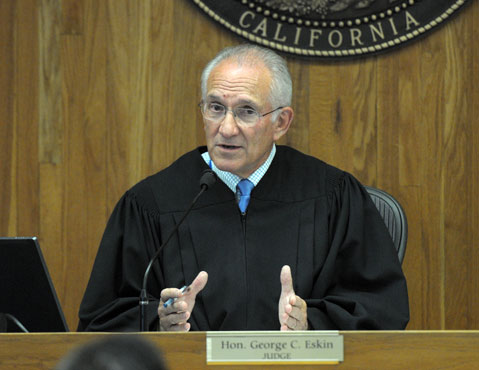Ex-Judge Appointed to Prison Pork Panel
Will Help Determine How to Spend Money Saved by Prop 47

Retired Santa Barbara judge George Eskin was just appointed to an executive steering committee established to direct the expenditure of money saved by releasing inmates convicted of nonviolent, nonserious crimes from state prisons in accordance with Proposition 47, the California ballot initiative passed in November 2014. Since going into effect, Prop. 47 has released 4,598 inmates. It currently costs $63,800 a year to keep an inmate in prison. According to the initiative, a portion of the savings generated by reducing prison populations is to be spent on various programs designed to keep those released from reoffending.
The committee Eskin has joined was organized by the Board of State and Community Corrections and is charged with drafting the criteria by which grant applications for such efforts will be judged; it will also evaluate grant proposals once they start rolling in. “It’s an intensive amount of work,” said Tracie Cone, spokesperson for the committee. Cone noted that five of Eskin’s committee members served time behind bars themselves and will bring that firsthand experience to the table. Eskin has worked as a prosecuting attorney, a criminal defense attorney, and judge. In addition, he was an outspoken proponent of Prop. 47 in Santa Barbara County, arguing with the likes of District Attorney Joyce Dudley and Sheriff Bill Brown, who believed it was a bad idea. Cochair of the committee is Leticia Perez — a UCSB graduate who now serves on the Kern County Board of Supervisors.
One of the first challenges will be to figure out how much money Prop. 47 actually saves. Governor Jerry Brown says it’s $29 million, but the Legislative Analyst’s Office said the true savings is $100 million more than that. Coincidentally, Prop. 47 was before the Santa Barbara supervisors this week. “Now, it’s the law but not yet the new normal,” said county assistant executive officer Joseph Toney. By that, Toney meant it’s too soon to say what effect Prop. 47 has had on criminal caseloads and the County Jail population. Initially, prosecuting attorneys and public defenders found themselves swamped by 1,750 petitions from prisoners seeking to convert felony convictions to misdemeanors. The vast majority were granted. Since Prop. 47 was passed, the number of felony charges filed has dropped by almost 1,000 and the number of misdemeanors increased by 1,200. Of those resentenced under Prop. 47, 483 were charged on new drug or theft counts within the first year.
Editor’s Note: This story has been corrected to reflect that members of the executive steering committee were named by the Board of State and Community Corrections. Also, Joseph Toney’s title has been corrected.



